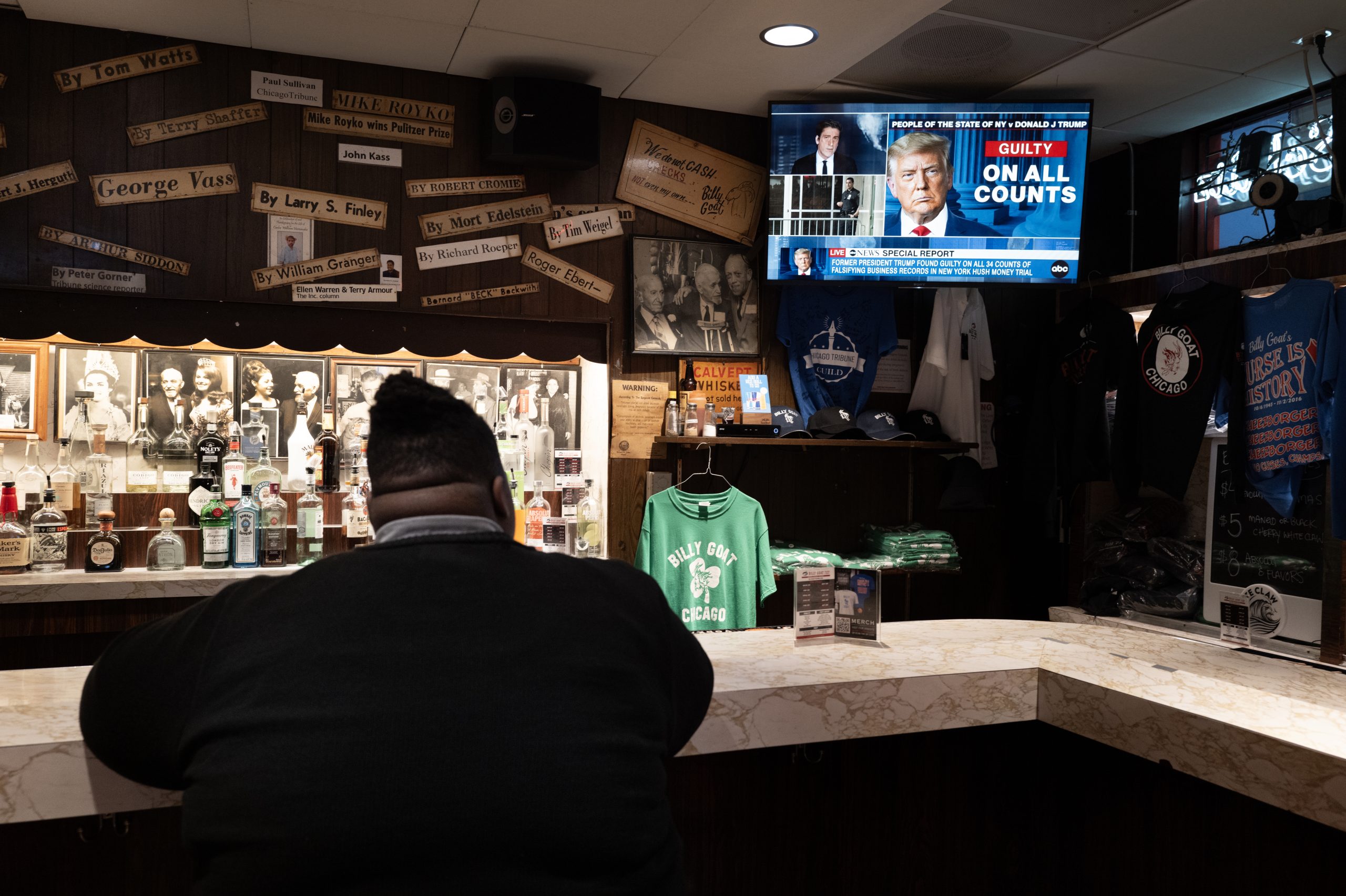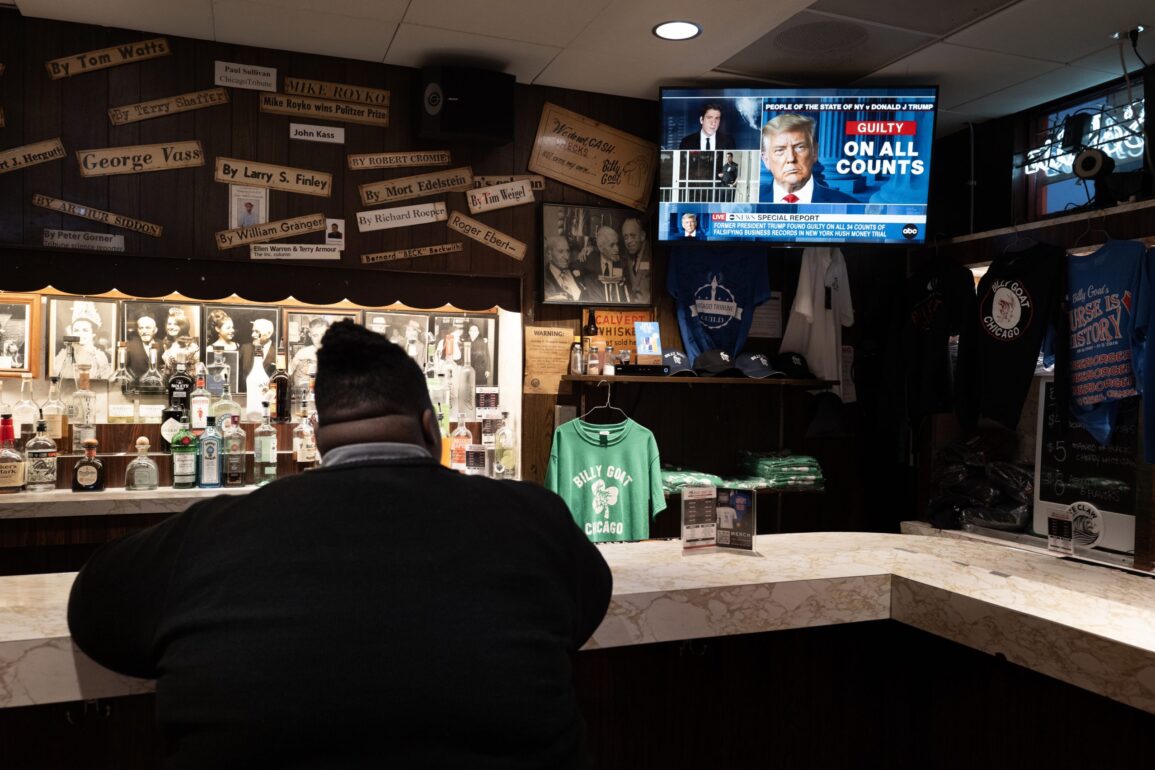
You could describe former President Donald Trump in many ways: ex-reality television personality, unsuccessful businessman, wannabe king. Also: felon.
On Thursday, a Manhattan jury found Trump guilty on all 34 felony counts of falsifying business records in a hush-money scheme involving the adult film star Stormy Daniels. He’s the first former president in U.S. history to be convicted of a crime.
While this is one of those rare moments when a white and powerful person is being held to account, Trump’s guilty verdict also brings to mind the wrenching racial inequalities of felony disenfranchisement, a Jim Crow-era relic that continues to prevent Black and brown people from achieving the so-called American Dream.
The Republican Party’s presumptive presidential nominee, “Teflon Don” can still vie for the White House. He also is unlikely to lose his right to cast a ballot in the November election, even though Black people convicted of felonies are disproportionately disenfranchised — lose their right to vote — for more benign crimes.
“The NAACP strongly believes that anyone who has been found guilty of criminal offenses of this magnitude is unfit to occupy the Oval Office,” Derrick Johnson, the president and CEO of the NAACP, said in a statement. “As Black Americans have been denied basic human rights due to less offensive crimes, any attempt to advance Donald Trump’s nomination for Presidency would be a gross advancement of white supremacist policy.”
The importance of the day wasn’t lost on Yusef Salaam, a member of the New York City Council.
He was one of five Black and brown teenagers who were wrongly convicted of raping a Central Park jogger in 1989. At the time, Trump demanded that New York “bring back” the death penalty.
“We should be proud that today the system worked. But we should be somber that we Americans have an ex-President who has been found guilty on 34 separate felony charges,” Salaam said in a statement. “We have to do better than this. Because we are better than this.”
Manhattan District Attorney Alvin Bragg brought the charges against Trump. He’s one of several Black prosecutors leading investigations against the former president.
Trump’s sentencing is scheduled for July 11, four days before the start of the Republican National Convention in Milwaukee. As the country waits until then, keep scrolling to clear up some of the lingering questions you might have about Trump’s guilty verdict.
Why can Trump still become president?
The U.S. Constitution has three requirements for presidential candidates: that they be a natural-born U.S. citizen, that they be at least 35 years old, and that they be a U.S. resident for a minimum of 14 years.
Trump meets each criterion.
Notably, the 14th Amendment, which Congress passed after the Civil War, prohibits from seeking the presidency anyone who has “engaged in insurrection or rebellion.” This stipulation was designed to keep former Confederates from regaining control of the levers of power.
However, in a major victory for Trump, the U.S. Supreme Court in March rejected the attempt to use the “insurrectionist clause” to remove him from the ballot for trying to overturn the 2020 presidential election.
For many Black Americans, the privilege Trump enjoys touches a raw nerve.
“The truth is that no Black person with Trump’s resume or rap sheet would ever be taken seriously as a candidate for president,” Keith Boykin, the co-founder of the National Black Justice Coalition, a civil rights organization focusing on Black LGBTQ communities, said toward the start of the trial.
Why is Trump unlikely to lose his right to vote?
Trump’s ability to vote in Florida — where he’s a resident — hinges on whether he receives prison time and can complete that sentence by Election Day.
In 2018, Floridians approved a constitutional amendment automatically reenfranchising most voters with prior felony convictions once they satisfy the terms of their sentences. Then, in 2019, Republican Gov. Ron DeSantis signed into law a bill requiring returning citizens to pay off all legal financial obligations in order to cast a ballot — what some call a “pay-to-vote” system.
Yet, legal observers doubt that Trump will go to jail.
For one, he’s a first-time offender. Additionally, he could receive a sentence such as probation that doesn’t mandate time behind bars, and Florida allows the state of conviction to determine whether someone can vote — in New York, people with felony convictions can cast a ballot as long as they aren’t incarcerated.
Plus, there’s the fact that Trump’s legal team can still appeal, and this process would probably drag on beyond November.
Why does Trump’s verdict recall the inequality of felony convictions?
Trump is expected to keep his right to vote, despite his felony conviction. Meanwhile, disenfranchisement disproportionately burdens Black people with felonies. This practice dates back to the Jim Crow era.
Consider that, last month, Mississippi state Sen. Angela Burks Hill, a Republican, defeated a bipartisan legislative effort to return voting rights to people with nonviolent felony convictions after they serve their sentences. Mississippi’s law permanently disenfranchising people convicted of certain low-level felonies harms Black Americans more than others. It’s also rooted in the state’s 1890 constitutional convention, the purpose of which was to “secure to the state of Mississippi white supremacy” and “eliminate the [N-word] from politics.”
A similar battle rages in Virginia. In March, a federal judge allowed a lawsuit challenging the state’s permanent felony disenfranchisement law to move forward. The plaintiffs argue that the law violates the Virginia Readmission Act, enacted following the Civil War to protect the rights of newly freed Black Americans in former Confederate states. More specifically, it was created to control felony disenfranchisement and limit state attempts to target Black Americans.
Read More: Alvin Bragg Isn’t the Only Black Prosecutor Taking on Trump
Draconian felony disenfranchisement laws aren’t only a problem in Mississippi and Virginia. Especially across the Deep South, millions of Americans’ voices are muzzled because of felony convictions.
“The most INSANE part of all this is that there is no law or nothing in the Constitution that would prohibit [Trump from] running for president as a convicted felon,” one X user noted. “Yet, millions of convicted felons are discriminated against from basic jobs and benefits.”
This isn’t to suggest that the outcome of the case is insignificant.
“Trump is guilty. It matters,” Sherrilyn Ifill, the former president and director-counsel of the NAACP Legal Defense and Educational Fund Inc., underscored on Threads. She added, “DA Alvin Bragg managed to do what no other prosecutor has yet managed. There were so many naysayers about this case.”
On Thursday, the country saw that there’s at least some corner of the criminal legal system where no one is above the law. Also: that system remains far from ideal.



